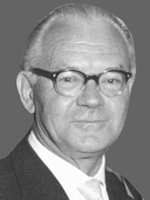Georg Wittig
1979 Nobel Prize in Chemistry

Georg Wittig (*1897 – †1987) received the Nobel Prize for his discovery of boron- and phosphorus-containing compounds in important reagents in organic synthesis. (with Herbert C. Brown)
Georg Wittig was born in Berlin and grew up in Kassel. After completing secondary school, he studied chemistry at the universities of Tübingen and Marburg and received his doctorate at the latter institution in 1923 under von Auwers. He earned his habilitation in 1926 and was appointed as adjunct professor in 1932.
Following a stint at the Braunschweig University of Technology, Wittig accepted a position in 1937 as associate professor at the University of Freiburg. In 1944 he became full professor and director of the chemistry department in Tübingen, and in 1956 he accepted the same position in Heidelberg.
Wittig’s wide range of research interests, encompassing both theoretical problems and the new methods of synthesis chemistry, became apparent even in the early years of his scientific career in Marburg and Freiburg. In these years he introduced reagents and methods in the area of metalorganic compounds which were to become the basis for his later accomplishments, which included the discovery of dehydrobenzol and two reactions which now bear his name, the Wittig ether rearrangement and the Wittig reaction. The latter reaction, discovered in 1953, has since attained great significance for the production of compounds with double bonds. Today it is used in large-scale industrial production to produce vitamin A and related compounds for many foods and animal feed.
For his discovery of the Wittig reaction, which has great significance for the synthesis of organic compounds as well as for numerous technologies, Wittig received the Otto Hahn Prize in 1967 and the Nobel Prize in 1979 (with H. C. Brown).